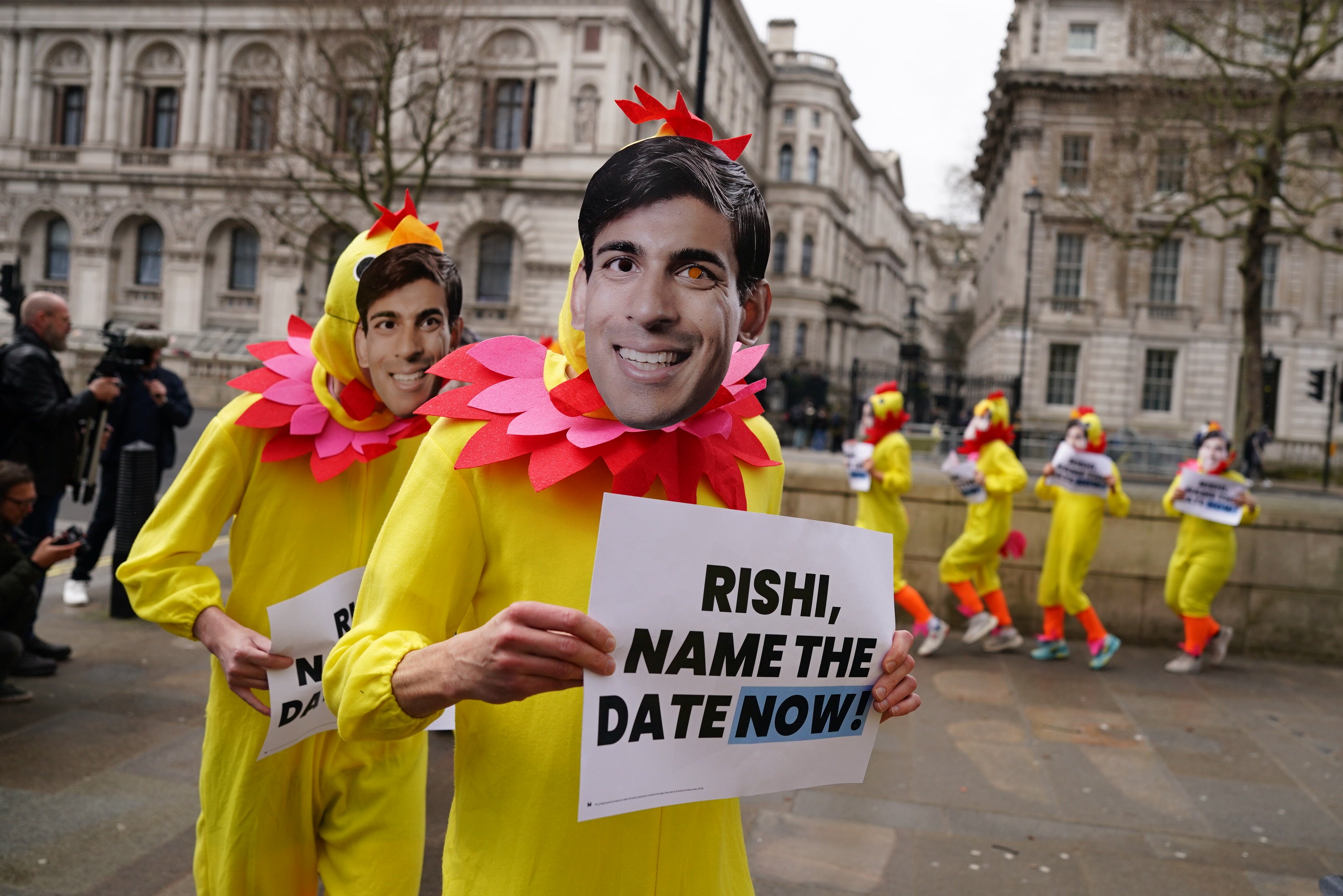There is one simple way for Sunak to silence the Tory rebels
With the Conservatives braced for a dreadful showing in the local elections, there’s one surefire way to ward off any revolt within the party, says Andrew Grice. Enough of the silly guessing games, prime minister – announce the date this weekend


Allies of Rishi Sunak are circling the wagons because they know his right-wing critics will attempt to oust him after tomorrow’s local elections in England. Government whips have told Conservative MPs to “take a long weekend”, imposing only a light, one-line whip for next Tuesday’s Commons business after Monday’s bank holiday, in the hope backbenchers keep away from Westminster – and any plotting.
But it’s still likely to be a bad long weekend for Sunak, as council and mayoral results trickle through until Sunday. The extended leave from the Commons won’t stop the plotting. To the whips’ frustration, rebel MPs can still plan their attempted coup from their constituencies by phone calls and WhatsApp groups.
It’s not clear whether right-wing rebels will garner the 52 Tory MPs needed to trigger a vote of confidence in Sunak as party leader. That will depend on the local results. Team Sunak has succeeded in setting the bar low: a win for either of the Tories’ most prominent mayors – Ben Houchen in the Tees Valley, or Andy Street in the West Midlands – would be seized on as grounds for hope, even though both have in effect run under their own independent brand rather than as Conservatives. The council results will tell us much more about the general election than the mayoral contests, but undecided Tory MPs looking for an excuse not to move against Sunak might take a Houchen or Street victory.
If Sunak is under threat after disastrous results, there is one way he could take the wind out of the rebels’ sails. Some senior Tories who support him say he should announce this weekend the date on which he wants an autumn general election – perhaps 14 November. One former cabinet minister told me: “The best thing he could do is get on the front foot and get on with fighting it – and tell us to do the same.”
The date would become the media’s focus and would concentrate most Tory minds. Hardcore rebels would doubtless argue there was still time to replace Sunak, but wavering MPs whose backing they need would probably rally behind Sunak as the election moved more clearly into view.
Announcing a firm date now would be much better than threatening (or even, in extremis, calling) a summer election that Sunak and most of his MPs don’t want, to try to keep the rebels at bay. Sunak told Tory officials this week the party needs “the greatest comeback in political history”. More realistically, its best hope is to avoid a crushing defeat, which would surely require voters noticing an improving economy by the autumn.
Certainty about the date would be welcomed in the financial markets, where some people play their own guessing game to try to make money out of it. It would spare Sunak and the rest of us from his pointless dance in media interviews when he refuses to rule out an election in June, July, before we move on to September.
True, it would be a break with convention to give so much notice of an election. But the sky didn’t fall in when we had a Fixed-Term Parliaments Act from 2011 to 2022. I think we should have kept a measure that handed some power from the prime minister to parliament. But both the Tories and Labour backed its abolition.
The act was a Liberal Democrat demand in the 2010-15 coalition agreement to prevent the Tories calling a snap election when it best suited them. (Instead, the Tories found another way to stitch up their coalition “partners”: seizing their seats in the South West in a below-the-radar campaign, which gave David Cameron an overall majority at the 2015 election).
The act was a misnomer. Our election date was not set in stone as in the US. A PM could still call an election with the support of two-thirds of all MPs in a Commons vote. Theresa May and Boris Johnson still got the elections they wanted.
As for criticism that Sunak would be announcing the longest election in history, the “long campaign” has already begun, as the parties use the local elections as a dry run.
Some advisers would probably tell Sunak that naming a date now would aid rival parties and help them plan their campaigns. But that doesn’t really wash. Everyone knows an election is coming – it must take place by 28 January 2025 – and Sunak can’t realistically delay it beyond 12 December (too close to Christmas after that).
In any case, trying to catch your rivals out by calling a snap election can backfire. It did for May in 2017; she needlessly threw away her overall majority.
Sunak might be tempted to keep the Tories’ opponents guessing so they have only the traditional notice of about five weeks. But there’s no point: he should end the silly guessing game and name the date this weekend.






Join our commenting forum
Join thought-provoking conversations, follow other Independent readers and see their replies
Comments